Dreams are funny things.
They can motivate us. Challenge us. But sometimes they scare us. When a dream feels too big, it can be frightening to believe in it — because the more you want something, the more it hurts if you fail.
Turning Dreams Into Goals
For years, I’ve been in this (self-destructive) boat when it comes to my filmmaking dreams. I’ve always wanted to be a writer/director of epic stories. But for much of the past decade, I’ve had no idea how to go about pursuing the directing side of this goal.
The film industry feels like such a mystery. And I’ll admit – I’ve been afraid, deeply afraid, to make that dream a goal. Something solid. Something with measurable steps. Something I can fail at.
Because isn’t is so much easier to keep a dream safely locked away in fantasy world, where nothing can touch it? Where you can never feel the pain of disappointment?
Easier, perhaps… but also emptier.
This past year, I had a turning point where I realized I wanted so badly to be a director that it was worth it. It was worth the risks. It was worth facing my fears and anxieties. It was worth the agony of failure.
Better to pursue what you want with all your heart, and not succeed… than to suffer the regret of knowing you didn’t give your all.
Importantly, though, I didn’t just have a perspective change. I also finally had a breakthrough in understanding how to pursue this dream. How to make it a goal.
That’s where Kamran Pasha comes in.
A Mentor… and a Plan
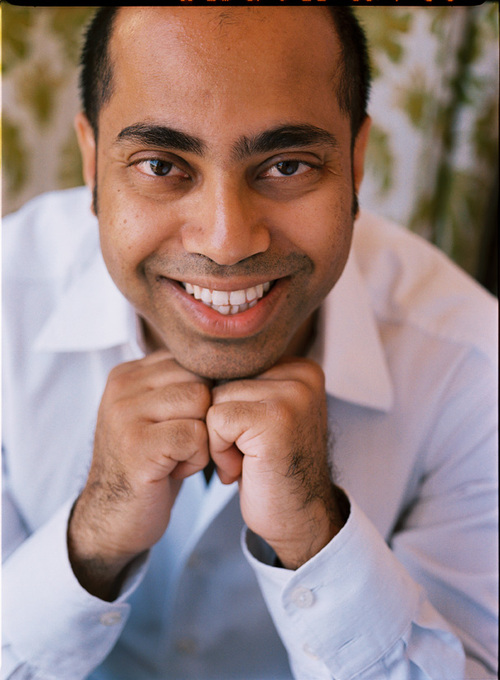
In 2022, my friend Heath Robinson introduced me to Kamran Pasha, a Hollywood screenwriter, producer, and novelist who mentors people trying to break into the industry.
The mentoring sessions I had with Kamran were life changing. He gave me advice creatively, but also helped me develop a plan for how I would make my shot at Hollywood.
Are you ready? Here it is…
- I need to move to Los Angeles. (Sigh. Figures.)
- I need to create a portfolio. (More on that in a minute!)
- I need to use that portfolio to seek representation. (That is, get an agent and a manager.)
For the curious (and those who might have similar goals or interests), I’ll explain each of these things in a bit more depth!
Why I’m Moving to Los Angeles
Do you really have to move to Los Angeles to be a filmmaker?
Well… no, technically. I’m a filmmaker right now. You will find pockets of independent filmmaking almost anywhere you go.
If I just wanted to be an indie director making low-budget, artsy films then perhaps I could get away with staying in Colorado (my current home). Maybe.
But my goal is to be a writer/director of epic movies. (More precisely: Genre films like action-adventure and horror.) The fact of the matter is, if I want to make these kinds of movies, I have to go to Hollywood. That’s the city where big genre movies get made. I have to network there, in person.
Why I… Don’t Want To
I’ll admit, I’ve been fighting this for years. I really have no desire to live in Los Angeles; the culture, traffic, and cost of living are all pretty unappealing to me.
After living on the East Coast most of my life (and disliking it there), I made the major move to Denver, Colorado in late 2019, and I love it here! It’s the only place that’s ever felt like home.
I love the smart, creative culture of Denver. I love the proximity to mountains and genuine wilderness. I love the sunny skies and snowy winters.

I’ve had visions of living in Colorado for the rest of my life. I have family here, and community.
Deciding that I need to leave this behind, for now, is not an easy conclusion to come to. But I want to be director badly enough that ultimately, it’s worth it.
Hopefully, I can establish myself, make the connections I need, and eventually move back. Fingers crossed!!!
Or worst-case scenario: I fail utterly at my goals and move back in defeat. Let’s not count on that one! But either way, the move is probably going to be temporary.
When Will I Move?
I just renewed a lease here in Denver, so the current plan is to finish that out and move one year from now — that is, June 2024.
Part of that does depend on job situations, though. I am already casually applying for jobs in LA, so if I were to receive a job offer sooner with relocation assistance, well, that will be my ticket to go!
I am somewhat hoping that doesn’t happen, just because I have a list of things I want to do in Denver before I move, and I want enough time to cross everything off the list!
But I will remain flexible. I want to be ready for whatever the universe throws at me. 🙂
A Writer/Director Portfolio
Let’s move on to that second thing on Kamran Pasha’s list: I need to create a portfolio. What does that look like?
Here’s the quick rundown. My goal is to be a writer/director of genre films like action-adventure and horror. As such, there are three portfolio pieces I need right now:
- A high-quality short film I wrote and directed
- A “passion project” screenplay
- A “practical” screenplay
The passion project is something big and epic. Something I won’t be able to get funded anytime soon (not until I’ve established myself in the industry, at least!), but it shows potential agents/managers the kind of thing I want to make one day. A demonstration of my ultimate goals!

The practical project is something much easier to get funded. Something low-budget with a high earnings potential. Something, in other words, that would be practical for me to try to make as my first feature film.
I’m writing a horror screenplay called Lock In for this purpose. Turns out though, the “practical” project is very much a passion project, too… so that’s always nice!
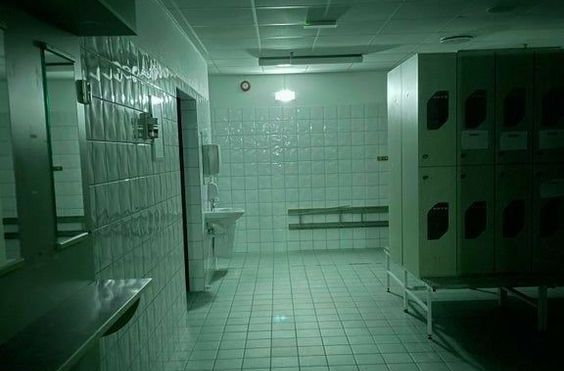
Why a Short Film?
The typical advice these days is for directors to make a short film — or short films, plural! This is the best way to demonstrate your abilities as a visual storyteller, without asking people to commit two hours out of their day.
Back when I was first interested in filmmaking, more than a decade ago, the advice I heard was different. There was a stronger emphasis on jumping to feature films. “Short films are a waste of time,” my mentor then used to say. It was better to make something profitable to kickstart your career, even if you’re doing it on a microbudget. You can’t sell short films. (Or at least, so I was told!)
But if your goal is to move beyond microbudget indie filmmaking (and it certainly is, for me), then you will need representation. And eventually, you will need investors.
Agents and investors both want to see quality. It is better to have a quality short film than a not-so-quality feature film.
Also… making short films is great practice! In her book Directing Actors (one of my favorites), Judith Bulter recommends that directors make as many short films as they can. They should practice directing constantly, even if they end up deciding not to share all of these practice projects publicly.
After all, practice makes perfect. The best way to learn is to do.
Why Not Just Make a Short Film?
With the benefits of short films, you might wonder why I’m bothering with the other part of the portfolio: the screenplays. Why not just make a short film (or several), submit them to festivals, and try to get representation that way?
Unfortunately, I’ve heard stories of this not ending well. They all go like this: An aspiring writer/director makes a decent short film. The short film gets accepted into some festivals, maybe even wins an award or two. An interested agent comes up to this director and says, “Hey, I liked your short film. What else have you got?”
And all the director can say is, “Ohhh you know, I’m working on something… I have some ideas…” And the agent has already lost interest.
The sad part is, this was the director’s moment! This was their chance! They may not get another. And they just blew it. Why? Because they weren’t prepared!
This is why I’m working on two screenplays. My advice from Kamran was to have these two screenplays not just written, but polished before I even think of submitting a short film to any contests or festivals.
That way, if I get the question — “What else have you got?” — I can respond with a couple ready-to-go log lines and a question of my own: “Would you like to read them?”
Why Not Write a Pilot?
Typically, it is recommended for screenwriters building a portfolio to have a polished feature-length script, and a pilot for a TV series. The reasoning is that pilots are shorter, so some people may only want to read the pilot.
I may end up including a pilot in my portfolio too, but I’m just doing feature screenplays for now largely because I had several I was super inspired for and ready to write! Sometimes, you’ve just got to follow that spark of inspiration when it strikes, you know?
Which leads us perfectly to another question…
But What About the Sequel to City of Reckoning?!?!
I know some of you are screaming at me right now. And you have every right to! I published a novel that kinda ended on a cliff hanger. How dare I work on anything that isn’t the sequel?!?!
I know. I KNOW. But ultimately, I feel this is how I need to prioritize my time… for a little while longer!
On a serious note, 2021 and 2022 were really awful years for me in my personal life. I experienced a house fire, a robbery, and a period of being unexpectedly out of work, among other stressors. As a result, my creativity took a nosedive for a while; that’s the main reason City of Reckoning’s sequel has been slow in coming.
When I had a much-needed improvement in mental health, and a return of the creative juices, it came with a massive boost of inspiration for one of these portfolio screenplays. (Inspiration? Hmm… more like… obsession? Hyperfocus fixation?)
The muses gave me no choice, you might say.
All that being said: As soon as I have my portfolio for Hollywood put together (or at least, when I’m a good stopping point; say, between drafts), I will return to the world of Nerasia and finish the book many of you are waiting for… I promise!
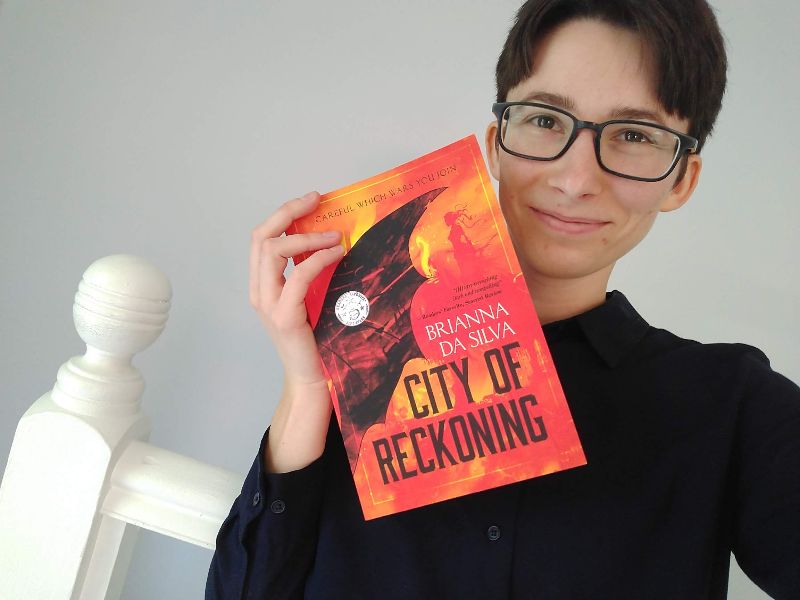
If it’s any consolation, I’m grown tremendously as a storyteller in the past year while studying, in more depth, how to write for the screen. I can say with full confidence that City of Reckoning’s sequel will only benefit from this delay, not suffer.
So, I’m sorry, I really am…. but I will do everything in my power to make it worth the wait!
What About Film School?
A perfectly valid way to switch careers into filmmaking is to go to film school. And this is definitely not off of the table for me; I will probably apply to a couple graduate film programs in LA this fall (with the possibility of attending next year).
As far as I’m concerned, though, the main benefit of going to film school is the networking opportunities. The actual art and craft of filmmaking is very possible to learn without formal education.
Personally, I’ve been spending the past year and a half in an intensive self-taught film school, with a focus on improving my knowledge and skills as a screenwriter and director. This has consisted of:
- Carefully studying LOTS of movies and screenplays (and taking detailed notes)
- Reading books on screenwriting and directing
- Watching countless hours of director commentaries, interviews, and YouTube video essays
- Familiarizing myself with film history (and general art history)
- Discussing story in depth via livestreams on Heath Robinson’s YouTube channel
- Getting professional feedback and critiques on my projects
I recently made a practice short film to apply many of the lessons I’ve learned. I’ll share it online when I’ve finished editing it!
Anyway, my point is that you don’t have to go to school to learn how to write and direct movies. Many of the great directors never went to film school. Networking is the most important element here that I’m after.
If I make the connections I need with film school, great! If I can make them without film school, great! If I go back to school, it will be with that specific focus and goal in mind.
As for learning… that is ongoing. Learning never stops.
How to Follow My Adventures
If you want to keep up with me, follow my progress on my goals and adventures, and know exactly when the next book is coming out, then I’ve got news for you!
Today, I’m re-launching my newsletter with a whole new look and strategy.
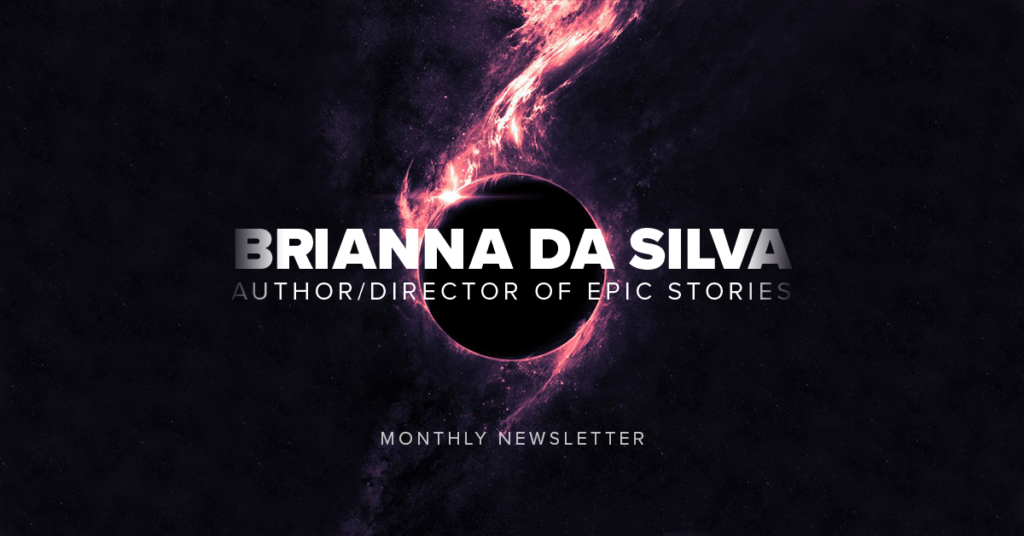
From now on, subscribers can expect one newsletter from me a month. In each newsletter, I’ll give an update on all my projects, so you always know what their status is!
I’ve basically stopped using Twitter and Instagram this past year, so this newsletter will now be the #1 way I communicate with people and let them know what I’m up to.
I’ll be using cool graphics in my newsletters to show you the progress on every project… here’s what they look like!

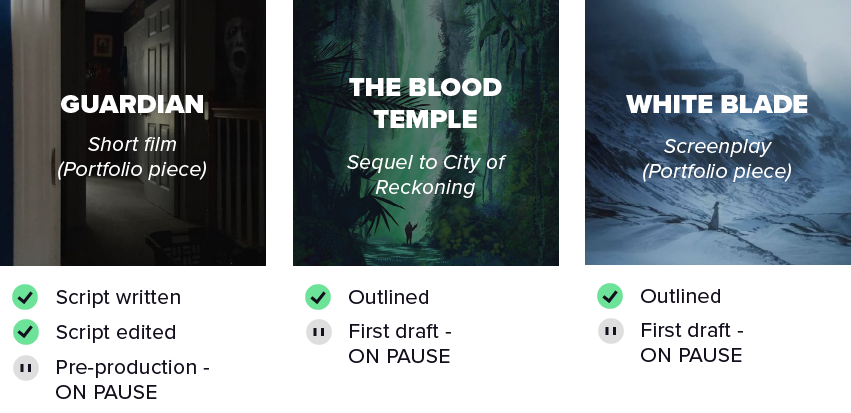
In future months, I’ll share more about each of these projects in my newsletter. You’ll receive exclusive behind-the-scenes looks at all my projects, first dibs on beta reading privileges, ARC announcements, and more.
So, if you want to keep up with me, here’s that subscribe link again!
I look forward to sharing with you my journey as I pursue those scary dreams. 😉
You may also want to read